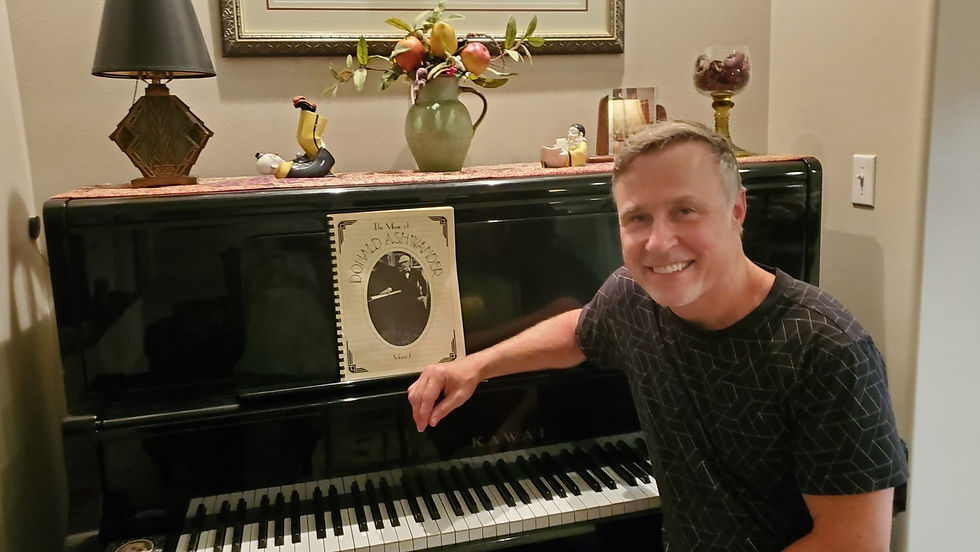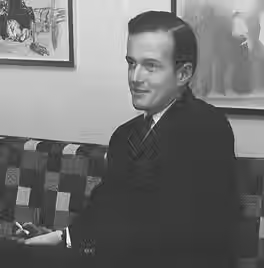Donald Ashwander
- Corte Swearingen
- Apr 29, 2019
- 8 min read
Updated: Feb 17, 2025

A self-professed "ragtime piano player," Ashwander's compositions and performances were largely responsible for the revival of interest in period ragtime (1897-1917) and the broadening and deepening of content and meaning in new ragtime works.
Donald Ashwander was born in 1929 in Birmingham, Alabama. His interest in American music led him to ragtime and other forms of American folk and popular music. After graduating from high school, Ashwander boarded the train, headed for New York City and enrolled at the Manhattan School of Music.
At that time, the New York musical scene was rigidly divided between the "classical" and the "popular," both flourishing independent of the other. While immersed in his studies, he attended many concerts and performances, but still found time to frequent out-of-the-way places where jazz reigned supreme. His interest in American music led him to Ragtime, Sacred Harp and other forms of American folk and popular music. Ashwander's life experience in the deep south, the New York music scene, his worldwide travels and his enjoyment of people from diverse cultures are all components of his thoroughly unique "Americana" music.
It wasn't until Rudi Blesh's 1965 book "They All Played Ragtime" that Ashwander gained critical acclaim. In that book, two of his first piano rags, "Friday Night" and "Business in Town" were published, proving that ragtime was alive and well, even if the ragtime era "officially" ended in the early 1920's.
During the next 26 years, Ashwander continued to compose and record a new breed of ragtime, venturing into often unconventional musical territory, seeking to move outside the rigidity of the classical ragtime form while remaining committed to the possibilities he found apparent in its roots. His life experiences in the deep south, the New York music scene, his world-wide travels and his enjoyment of people from all cultures are all components of his thoroughly Americana music.
"If, as I had planned, I was going to spend my life composing music, I would have to try to derive a viable language from my very American but seemingly fragile musical legacy."
Donald Ashwander made many contributions to American music, both as composer and lyricist. He was honored by the Guide Foundation and received ASCAP awards. His work with The Paper Bag Players has been recognized with a New York State Governor's Award, as well as awards from the American Theater Association and The American Alliance for Theater and Education.
Here are Donald's own words about his lifetime in music, written in Brooklyn on May 1st, 1989.
"At Manhattan School of Music, I became adept at musical notation. I was not interested, however, in writing music in the 'International Style' which was the accepted academic mode of the time (1951). I realized that none of the musical languages I had studied would be right for me as a composer.
If, as I had planned, I was going to spend my life composing music, I would have to try to derive a viable language from my very American but seemingly fragile musical legacy.
The attempt to understand this legacy led me to relisten, with new purpose, to the hymns, Sacred Harp music, Southern black music and the popular music of the 1930's and 40's that had been the throwaways of my growing-up years. My efforts to define personal musical roots led me back through the spectrum of American music to its beginnings.
The process I found myself in seemed to be very slow-growing, requiring much patience. But I felt that this process would eventually result in a music that was truly myself, and firmly anchored to the world I knew.
The necessity of making a livelihood led me away from the New York musical into the world of the shipyard worker, the merchant seaman, the cocktail and piano-bar pianist and other more or less interesting stop-gaps. Instead of being detrimental, these new experiences away from the New York musical scene were nourishing. Musical composition continued to be the core of my life.
I deeply wanted my music to be liked, but a life spent chasing the will-o'-the-wisp of the popular hit was definitely not for me. When well-meaning family and friends would suggest that this was the only "realistic" course to be taken in this day and age, I would instantly be thrown into a profound and morbid depression. At times, it seemed I was neither fish nor fowl - fitting into neither the academic nor the commercial world. Those were dark moments.
It was not until my late thirties that it began to dawn on me that the musical language and method of work I had struggled over had begun to materialize. That was a very fine time for me, filled with assurance and contentment. The process continues."
Ashwander joined The Paper Bag Players in 1966, as resident composer, musical director and performer, he introduced the electric harpsichord (along with slide whistle, kazoo, rhythm box and an array of other instruments). Ashwander died suddenly on October 26, 1994 while walking onstage to perform with members of the The Paper Bag Players. Sharon Moore, his niece, expressed "He died too soon, only 65. I know he had every intention to write more, perform more, do more CDs. I feel he was at his peak and the older he got the better he would become. He was always exploring." The Paper Bag players still perform Ashwander's music 25 years after his death.
On January 1, 1995, Charles Osgood of CBS Sunday Morning, gave tribute to Donald in the broadcast's annual "Salute to Heroes" by saying, “He was, in fact, a serious composer, but a couple of generations of children loved him because onstage with The Paper Bag Players, he was anything but serious. Goodbye to a hero of glee.”
Selected Performances
Dove In The Window (1970): "Dove In The Window" is a shining example of Ashwander's distinctive and thoroughly Americana musical voice. The title itself conjures imagery of a peaceful scene, where a dove perches by an open window, bringing with it a sense of serenity and hope. Ashwander's composition captures the essence of this image through its melodic grace and harmonic warmth.
For pianists, the piece offers a rewarding exploration of Ashwander's musical vision. The piece demands a nuanced and expressive performance, with attention to the delicate interplay of melody and harmony. It is a composition that allows performers to connect with the heart of Americana and to convey the depth and richness of Ashwander's musical storytelling.
Forgotten Ballrooms (1983): "Forgotten Ballrooms," pays tribute to the burgeoning preservation movement in America that has breathed new life into abandoned and historically significant structures. In the not-so-distant past, only a select few possessed the sophistication to recognize the beauty and historical significance of seemingly ordinary places such as derelict railway depots or 1920s filling stations. Today, however, there are people discovering, restoring, and utilizing these architectural gems. This newfound reverence for the past has given rise to a unique breed of enthusiasts who engage in what can only be described as ballroom archaeology.
"Forgotten Ballrooms" takes inspiration from this rarefied and dedicated movement of ballroom archaeologists. Throughout the country, these individuals venture into the hidden corners of history, opening doors to ghostly rooms that resonate with the echoes of bygone dramas and memories long past. As the pianist embarks on this musical journey, they evoke the palpable atmospheres of these once-vibrant spaces, now shrouded in the mists of time.
The compositions syncopated rhythms, playful melodies, and intricate harmonies pay homage to the era when these ballrooms were the centers of social life and entertainment. Yet, there is an underlying sense of nostalgia and longing, as if the music itself yearns to recapture the forgotten stories and dances of the past.
Through Ashwander's musical tribute, we are reminded of the enduring power of history, culture, and the resolute spirit of those who seek to preserve the memories and grandeur of America's forgotten ballrooms.
Old Streets (1971): "Old Streets takes listeners on a poignant journey through the corridors of memory and nostalgia. American jazz critic Rudi Blesh once remarked about Ashwander's music, stating that he "draws on memory and the unconscious, a remembrance of things past." "Old Streets" embodies this sentiment, offering a musical narrative that transports us to a bygone era, evoking the charm and character of old Southern houses nestled behind ancient trees.
Ashwander not only composes a melody but also paints a vivid musical portrait of a bygone era. Through its enchanting harmonies and evocative phrasing, the piece becomes a vessel for the recollection of cherished memories and the spirit of places long gone.
Wax Paper Dance (1967): This charming piece was created for The Paper Bag Players, a renowned non-profit theater company dedicated to providing enriching and imaginative theatrical experiences for children. Founded in 1958, The Paper Bag Players have a long history of captivating young audiences with their unique productions, and "Wax Paper Dance" serves as a musical testament to their mission.
The piece is a reminder of the vital role that music plays in enhancing storytelling and creating memorable experiences for young audiences. It reflects Ashwander's expertise in crafting syncopated melodies reminiscent of his ragtime compositions. The piece's spirited and playful nature invites listeners to participate in a musical dance, mirroring the enchanting and imaginative world of children's theater.
"Wax Paper Dance" not only serves as a testament to Donald Ashwander's musical creativity but also as a musical companion to the magical productions of The Paper Bag Players, enriching the lives of young audiences through the power of music and storytelling.
To hear more of Ashwander's music, be sure to check out the Donald Ashwander Playlist on my American Piano Music YouTube channel.
The Donald Ashwander Recording Project
In July of 2024, I travelled to Gulf Shores, Alabama at the invitation of Sharon Moore (Ashwander's niece) and Judy Moore (Ashwander's sister). The purpose of the visit was to go through all of Donald Ashwander's hand-written manuscripts in order to locate all of his solo piano music. After a full day of going through everything, we located 70 complete compositions for solo piano. I'm happy to announce that I will be recording all of these pieces for a 4-volume release of "Donald Ashwander: The Complete Works for Solo Piano." Below are some pictures of my trip, including one of me sitting at Ashwander's personal piano - the same one he used to compose all this wonderful music.



Locating the Music
Donald Ashwander's music can be purchased from either Sheet Music Direct or Sheet Music Plus.
List of Piano Compositions
Friday Night (1965)
The Ragtime Pierrot (1965)
The Winter Fields (1966)
Voices, Voices (1966)
Upstairs Rag (1966)
Harlem River Houseboat Rag (1966)
Gayola Rag (1966)
Mobile Carnival Rag-Tango (1966)
Late Hours Rag (1966)
Sea Oats (1966)
Business in Town (1966)
Astor Place Rag Waltz (1966)
Second Floor Front (1967)
Peacock Colors (1967)
Radiating Star (1967)
Okra Rag (1967)
Perdido Bay Moon Rag - Version 1 (1967)
Alabama Backroads (1967)
The Moon Walk (1969)
Empty Porches (1969)
Radiating Star (1970)
Traditional Patterns (1970-71)
Grand Central (1971)
Old Streets (1971)
Waterloo Rag (1972)
Threnody (1972)
Mulberry (1972)
Reason’s Fee (1972)
Causeway Blues (1972)
Cascade Plunge (1973)
Turnips (1973)
First Avenue (1973)
Bay Breeze (1973)
Little Saints Hopping (1973)
Saratoga Rag (1974)
October (1974)
Sunday Night, Manhattan (1975)
Houston Street (1975)
Summer Garden (1976)
We Danced (1976)
Bicycle Race (1977)
The Garden at Night (1977)
Here and Gone (1977)
Grand Central (1977)
Nocturne in E (1959, revised in 1979)
Evanescence (1979)
The Spider’s Transformation (1979)
Street Corner Pierrot
Request (1979)
Playgrounds (1982)
Weekday Songs (1982)
East River Lights (1983)
Forgotten Ballrooms (1983)
Brooklyn Start and Stop (1984)
On the High Wire (1985)
Moving Man (1988)
Perdido Bay Moon Rag - Version 2 (1988)
Illicit Demands (1989)
Required Responses (1990)
Yard Sale Rag (1992)


